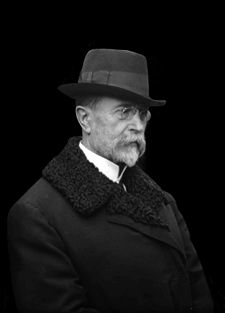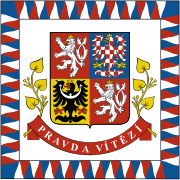Tomáš Garrigue Masaryk
|
Tomáš Garrigue Masaryk
|
|
 Masaryk digitally removed from photograph by Josef Jindřich Šechtl, 1918 |
|
|
1st President of Czechoslovakia
|
|
|---|---|
| In office 14 November 1918 – 14 December 1935 |
|
| Succeeded by | Edvard Beneš |
|
|
|
| Born | 7 March 1850 Hodonín, Austria-Hungary |
| Died | 14 September 1937 (aged 87) Lány, Czechoslovakia |
| Spouse | Charlotte Garrigue |
| Profession | Philosopher |

Tomáš Garrigue Masaryk (pronounced [ˈtomaːʃ ˈɡarɪk ˈmasarɪk]), sometimes called Thomas Masaryk in English, (7 March 1850 – 14 September 1937) was an Austro-Hungarian and Czechoslovak statesman, sociologist and philosopher, who as the keenest advocate of Czechoslovak independence during World War I became the first President and founder of Czechoslovakia.
Contents |
Biography
Masaryk was born to a working-class family in the predominantly Catholic city of Hodonín, Moravia.[1] His father Jozef Masaryk, a carter, was a Slovak from the Hungarian part of Austria-Hungary (later became the eastern province of Slovakia in Czechoslovakia), and his mother Teresie Masaryková (née Kropáčková) was a German from Moravia. They married on 15 August 1849, Teresie Kropáčková being two and half months pregnant.
The identity of Masaryk's biological father is still being disputed by the historians. There are rumours that Masaryk's father could have been Austrian Emperor Francis Joseph I, but the strongest possible evidence is pointing towards Nathan Redlich, german speaking Jew from Hodonín and Masaryk's mother's employer.
As a youth he worked as a blacksmith. He studied in Brno, Vienna (1872-1876 philosophy with Franz Brentano) and Leipzig (with Wilhelm Wundt). In 1882, he was appointed Professor of Philosophy in the Czech part of the University of Prague. The following year he founded Athenaeum, a magazine devoted to Czech culture and science. He challenged the validity of the epic poems Rukopisy královedvorský a zelenohorský, supposedly dating from the early Middle Ages, and providing a false nationalistic basis of Czech chauvinism to which he was continuously opposed. Further enraging Czech sentiment, he fought against the old superstition of Jewish blood libel during the Hilsner Trial of 1899. The topic of his doctoral thesis was the phenomenon of suicide.
Masaryk served in the Reichsrat (Austrian Parliament) from 1891 to 1893 in the Young Czech Party and again from 1907 to 1914 in the Realist Party, but he did not campaign for the independence of Czechs and Slovaks from Austria-Hungary. When the First World War broke out, he had to flee the country, with a Serbian passport, to avoid arrest for treason, going to Geneva, to Italy, and then to England, where he started to agitate for Czechoslovak independence. In 1915 he was one of the first members of staff of the newly formed School of Slavonic and East European Studies, which was initially a department of King's College London[2], and is now a part of University College London, and where the Student Society and Junior Common Room are named after him. He became Professor of Slav Research at King's College in London lecturing on "The problem of small nations".
During the war, Masaryk's intelligence network of Czech revolutionaries provided important and critical intelligence to the Allies. Masaryk's European network worked with an American counter-espionage network of nearly 80 members headed by E.V. Voska who, as Habsburg subjects, were presumed to be German supporters but were involved in spying on German and Austrian diplomats. Among others, the intelligence from these networks were critical in uncovering the Hindu-German Conspiracy in San Francisco.[3][4][5][4][6] In 1916, Masaryk went to France to convince the French government of the necessity of disintegrating Austria-Hungary. After the February Revolution in 1917 he proceeded to Russia to help organize Slavic resistance to the Austrians, so-called Czechoslovak Legions. In 1918 he traveled to the United States, where he convinced President Woodrow Wilson of the rightness of his cause. Speaking on 26 October 1918, from the steps of Independence Hall in Philadelphia as head of the Mid-European Union, Masaryk called for the independence of the Czecho-slovaks and other oppressed peoples of Central Europe.

With the fall of the Austro-Hungarian Empire in 1918, the Allies recognized Masaryk as head of the Provisional Czechoslovak government, and in 1920 he was elected the first President of Czechoslovakia. He won re-election twice subsequently, and held office until 14 December 1935, when he resigned owing to bad health and Edvard Beneš succeeded him. Masaryk enjoyed almost legendary authority among the Czech and Slovak people.
Masaryk married Charlotte Garrigue, a Protestant American, from whom he took his middle name, who died near Prague in 1923 from an unspecified illness. His son, Jan Masaryk, served as Foreign Minister in the Czechoslovak government-in-exile (1940-1945) and in the governments of 1945 to 1948. Charlotte gave birth to four other children, Herbert, Alice, Anna and Olga.
Masaryk died from natural causes in 1937 at the age of 87, in Lány, Czechoslovakia, now Czech Republic. His funeral is pictured in the art sleeve for the American band Faith No More's final LP, Album of the Year, to portray the end of a golden age.
Masaryk wrote several books, including The Problems of Small Nations in the European Crisis (1915). The writer Karel Čapek wrote a series of articles entitled 'Hovory s TGM'(=Conversations with TGM) which were later collected as a form of autobiography.
Philosophy and religion
Masaryk's life motto was: "Nebát se a nekrást" (=Do Not fear and do not steal). Masaryk as a philosopher was an outspoken rationalist and humanist. He emphasised practical ethics, reflecting the influence of Anglo-Saxon philosophers, French philosophy, and especially the work of 18th Century German philosopher, Johann Gottfried Herder, who is considered the founder of nationalism. He was critical of German idealistic philosophy and Marxism. Although born Catholic, he eventually became a non-practicing Protestant, influenced in part by the declaration of Papal Infallibility in 1870 and his wife, Charlotte.
Order of Masaryk
The Order of Tomáš Garrigue Masaryk, a state decoration of the Czech Republic and in Czechoslovakia (established in 1990), is awarded to individuals who have made outstanding contributions to humanity, democracy and human rights.
About how was T. G. Masaryk recognized witness this sentence: "As long as Masaryk will live, Hitler won't start war."
Memorials
Avenida Presidente Masaryk ("President Masaryk Avenue"), Mexico City's equivalent of Fifth Avenue in New York City, takes its name from him, as do Masaryktown, Florida and kibbutz Kfar Masaryk in Israel (near Haifa). This kibbutz was founded largely by Czechoslovak immigrants.
There is a statue of Masaryk in Washington, DC on Massachusetts Avenue as well as in Chicago on the Midway.
Bibliography
- Základové konkretné logiky ("The foundations of concrete logic") Prague, 1885 (German translation, Versuch einer concreten Logik, Vienna, 1887)
- Otázka sociální ("The social question") Prague, 1898 (German translation, Die philosophischen und sociologischen Grundlagen des Marxismus, Vienna, 1899)
- Russland und Europa Jena, Germany, 1913 (English translation by Eden and Cedar Paul, The Spirit of Russia, London, 1919)
- Světová revoluce ("The world revolution") Prague, 1925 (English translation edited by H. W. Steed, The Making of a State, London, 1927)
- Hovory s T. G. Masarykem ("Conversations with T. G. Masaryk") Prague, 1931–1935) by Karel Capek (English translations by M. and R. Weatherall, President Masaryk Tells His Story, London, 1934, and Masaryk on Thought and Life, London, 1938)[7]
Family Tree
|
|
|
|
|
|
|
Tomáš Masaryk |
|
|
|
Charlotte Garrigue | |||||||||||||||||||||||||||||||||||
|
|
|
|
|
||||||||||||||||||||||||||||||||||||||||||
|
|
|
|
|
|
|
|
|
|
|
|
|
|
|
|
|
|
|
|
|
|
|
|
|
|
|
||||||||||||||||||||
|
|
|
|
|
|
|
|
|
|
|
|
|
|
|
|
|
|
|
|
|
|
|
|
|
|
|
||||||||||||||||||||
| Alice |
|
Herbert |
|
Jan |
|
Eleanor |
|
Olga |
|
Hana | |||||||||||||||||||||||||||||||||||
References
Notes
- ↑ This was then part of the Austro-Hungarian Empire, and is now in the Czech Republic.
- ↑ UCL School of Slavonic & East European Studies Handbook for MA Students 2007
- ↑ Popplewell 1995, p. 237
- ↑ 4.0 4.1 Masaryk 1970, p. 50,221,242
- ↑ Voska & Irwin 1940, p. 98,108,120,122,123
- ↑ Bose 1971, p. 233,233
- ↑ Donald E. Borchert, ed. (2006), "Masaryk, Tomáš Garrigue", Encyclopedia of Philosophy, 6 (Second ed.), Thomson-Gale, pp. 1, ISBN 0-02-866072-2
Literature
- Bose, A.C (1971), Indian Revolutionaries Abroad,1905-1927, Patna:Bharati Bhawan., ISBN 8172111231.
- Masaryk, T (1970), Making of a State, Howard Fertig, ISBN 0685095754.
- Popplewell, Richard J (1995), Intelligence and Imperial Defence: British Intelligence and the Defence of the Indian Empire 1904-1924., Routledge, ISBN 071464580X, <http://www.routledge.com/shopping_cart/products/product_detail.asp?sku=&isbn=071464580X&parent_id=&pc=>.
- Voska, E.V & W Irwin (1940), Spy and Counterspy, New York. Doubleday, Doran & Co.
External links
- Who's Who: Tomas Masaryk
- Works by or about Tomáš Garrigue Masaryk in libraries (WorldCat catalog)
|
|||||||

